- Home
- Lloyd Alexander
The Gawgon and the Boy Page 7
The Gawgon and the Boy Read online
Page 7
The men from the ambulance apologized, they were sorry to buckle him into a canvas straitjacket, but it was for his own good. Captain Jack did not struggle when they led him out of the house. He was well behaved and looked tired. In the street, he glanced around, squinting in the sunlight. The ambulance took him away.
Later, my grandmother went through the motions of fixing breakfast. None of us wanted any. We sat at the table for a while. I understood that Nora's squawking had set him off, but as I said apart to The Gawgon, I didn't see why Captain Jack got so upset. Nora, after all, was only a bird.
"She made him think of the war," The Gawgon said. But that, I said, was over long ago.
"Not for Jack," The Gawgon answered. "He never talked about it to us. But his sister knew. She told us when she brought him to live here. She had to work all day, you see, so your grandmother promised to look after him. Something had happened that he never got out of his head."
I asked what it was. The Gawgon did not answer right away. Then she said, "He was fond of you, and I know you were fond of him. Try to understand this. He shot his friend. No, it wasn't murder," The Gawgon quickly added, seeing the look on my face. "They were ordered out on a night patrol. A stupid order, no point in it. No doubt some general was bored and wanted to stir things up. The trenches were so close, the Germans saw them in the moonlight and opened fire.
"Jack was badly wounded; his friend, worse. The rest of the patrol were dead. His friend kept screaming for Jack to shoot him, he couldn't stand the pain. Jack wouldn't do it. As his sister told us, they lay there a long time, with Jack's friend crying and begging to be put out of his misery.
"Jack hoped his friend would die soon, but he didn't. At the end, Jack shot him in the head with his revolver.
"When it was daylight, the Germans waved a flag of truce and let the Americans carry back the bodies. They all stayed in their own trenches after that. Jack was taken to a field hospital, and they sent him home."
I never thought of Captain Jack having relatives, but next weekend, I was at my grandmother's house when a plain looking woman in a summer frock came to collect his belongings. She was his sister; my grandmother talked with her out of my earshot. Then a man came with a horse and cart to haul out the gramophone and records. The empty room still smelled of Turkish tobacco. The canvas window shades had been rolled up. I did not go in.
There was nothing else beyond some bundles of clothes and a few cardboard boxes in the cellar. I helped carry them up. "I don't think he'll need any of this," my grandmother said.
"They're his things, even so," Captain Jack's sister said. "They're all he has." Taking away the bundles left a gap like a tunnel in the heaps of odds and ends stacked against the cellar wall. One of my privileges was to root through whatever came to hand. Some days later, when things calmed down, I set about probing the tunnel.
Our cellar on Lorimer Street was too tidy to be interesting. My mother even dusted the chute, like a sliding board, that the coal man used to pour down chunks of coal into the storage bin. My grandmother's cellar, in contrast, was so disarrayed I could always find some surprise or other.
Most often, it was something with a vital part missing: a sewing machine treadle without the sewing machine; a reel of old movie film but no projector to show it; a couple of headless golf clubs; a gadget for clamping metal caps on homemade root beer, but no caps or bottles. Clues that my elders must have gone around playing golf, watching movies, drinking root beer, and leading glamorous lives of their own before I existed.
That morning, when I thought the vein of this particular mine was exhausted, from the deepest level I pulled out a wooden box. It rattled intriguingly. I, of course, lifted the lid. Inside lay a dozen or more toy soldiers, cast in lead, their paint still bright.
I immediately claimed possession. Leaving everything else strewn about the floor, I seized the box and galloped upstairs to show The Gawgon what I had unearthed.
The Gawgon was sitting at the roll top desk. When I held out the box, she stiffened. "Where did you get that, Boy?" she said in an odd voice. As I began explaining, she took the little figures and stood then one by one on the desk. "Union soldiers," she said. "There used to be Confederates, too, and horses.
"They all had their own names. I forget what they were." She picked up a blue-jacketed rifleman and turned it back and forth. "You found them, you can keep them." I asked if they had been her toys. The Gawgon gave a quick shake of her head. "My son's."
12 The Gawgon's Other Boy
"You didn't know? I'm surprised," she said, though doubted she was half as surprised as I was. "I assumed you already heard about it," The Gawgon said. "Family gossip-or so it used to be. Gossip, I suppose, goes out of date like everything else." I expected her to change the subject, as my elders did when they caught me eavesdropping. Instead, she went on: "His name was David, the same as yours. A quick, bright boy. You never knew what he'd be up to. He had a wild streak, like his father. He was close to your age when he died," The Gawgon said. "Influenza. They couldn't save him. That was the last time I saw his father. I wrote to him when it happened-he was always off to someplace or other. A wonder he came back at all."
The Gawgon's chin went up, her eyes flashed for an instant. Then her face softened. "No, I shouldn't say that. He did what he could. I was angry at him-for a little while. I could never stay angry at him very long. He was a charmer. And I? What did he call me? intrepid? Fearless? Foolhardy, more like it.
"Yes," The Gawgon said, "he was the cheeky fellow who took my photo at the Pyramids. He kept trailing after me like a long-legged, overgrown puppy. I couldn't get rid of him. And didn't want to.
"We parted company in Cairo. When the tour ended, my employers didn't keep me on as a governess. I went home to Philadelphia. A few months later, that rascal came and found me. I was teaching school then. I had just come out of class and there he was, sitting on a bench in the hall. He asked if I remembered him."
"Oh, yes!" The Gawgon smiled remembered him very well indeed.
"He wanted to be a photographer. That was the great new career in those days. He was going to Paris on the wild chance of studying with a Frenchman named Nadar, very famous at the time.
"He asked me to go with him," said The Gawgon. "Can you imagine? The nerve of the fellow! Standing there shuffling his feet, pretending to be shy-which he never was-with that loopy grin of his. I should give up my work and run off with a total stranger?
"I did, of course," said The Gawgon. "Yes, he was a charmer. A footloose charmer. He thought staying in one place was a crime against nature; and I went along with him.
"He never did study with Nadar. He set up his own portrait studio in Paris. No sooner did we start doing well than we dashed away to look at castles in Spain or ride gondolas in Venice. Between times, I gave English lessons. He wrote travel articles for the newspapers-when he felt like it."
The Gawgon broke off and went to sit in the rocking chair. T waited, saying nothing. After a time, she looked up at me:
"When I knew I was expecting our child, I went home. He promised to join me later. He never got around to it. Mary-your grandmother-took me in. I've lived with her ever since.
"That was the last T saw of him until Davy died. He came back for three days. He wanted to stay longer, but he had started working as a foreign correspondent, always caught up in one thing or another. Good at his job, I'll say that much for him.
"He had gone gray by then, but as big a charmer as ever. He was too old for it, but when the war started he grinned his way into being a front line photographer. Sometimes I'd have a letter from him. He was killed in France, in the Argonne Forest."
This was more than any adult had ever seen fit to tell me. I felt somehow blessed and grateful. And heartbroken for her. I expected to see her grief-stricken by her memories.
"What young fools we were," The Gawgon said. "If I had it all to do over?" She paused and shook her head. "If do exactly the same. No, Boy, I don't regret o
ne minute of it."
Her face was shining like a girl's. I knew The Gawgon's opinion of Dr. McKelvie as a pill-roller and cheerful undertaker. He was, to me, a saint. The question came up again, at the end of summer, about my going back to Rittenhouse Academy. Dr. McKelvie strongly warned against it. So I was spared again, and I blessed him.
"Thank God for Annie," I heard my father say to my mother one evening. "That's a saving. Elise is taken care of, for now. At least, her term's paid in advance."
Much later, I understood why he seemed relieved. The store had not been doing well. Customers were not flocking to fill their houses with Oriental goods. On the contrary, they were staying away in large numbers.
"It's beyond me," my father said. "What are they doing? Buying cars? Playing the stock market?" He did try something he was sure would excite public interest: Mexican jumping beans.
From one of his suppliers he bought a bushel of what looked like old peanuts with the reddish-brown skin still on them. They did not actually jump into the air, but they did twitch from time to time; some quite lively, others just sat there unwilling to do much of anything. He put a big platter of them in the store window and a bowlful on the counter next to the cash register.
"What it is," my father said he had brought some home for our amusement, "there's a little worm inside. When it moves, the bean jumps."
"What do they do all day?" my mother asked. "Suppose they eat their way through the shell? They're going to come out and crawl all over the house."
"Don't worry," said my father. "It's never been known to happen."
Nevertheless, my mother did not like the idea of the worms being sealed up in a bean dungeon without air and sunlight. Tenderhearted by nature, she felt sorry for them. She wondered if she should slice open the beans and liberate the prisoners. They could live outside in the are away.
"They're happy where they are," my father said. "Let them be. They're better off in Philadelphia than in Mexico." The Mexican jumping beans had no connection with Oriental goods. But, my father pointed out, he was now the only source of jumping beans in Philadelphia; in effect, the jumping bean king.
He reckoned the beans would lure passersby into the store, giving him the chance to sell them other, and more expensive, merchandise. After a couple of weeks, he realized his scheme was not working. The Mexican jumping beans made no difference at all; but having paid for them, he was not going to throw them out. He carried them home in a sack. He planned on keeping them for a return engagement in the spring, when he was sure they would do better.
To accommodate the beans, my mother put them in bowls and saucers throughout the house. They kept quietly to themselves, twitching occasionally. The only excitement they produced was on an evening when Uncle Eustace stopped by to commiserate with my father. Uncle Eustace was having difficulties with tombstone sales. People were not dying as often as they should.
Uncle Eustace sat gloomily on the sofa. He kept dipping absentmindedly into a dish of beans on the end table. In his morose frame of mind, he no doubt mistook them for salted peanuts.
"Stop! Stop!" My mother gasped when she saw what he was doing. "They're full of worms!" Uncle Eustace sprang to his feet and spat his mouthful of beans onto the Oriental rug. "That's not funny, Dog Flea," he shouted at my father, who had burst out laughing.
Despite explanations from my mother, Uncle Eustace was still convinced my father meant to play a joke on him and went away in a huff The beans seemed comfortable in their new environment. My task, each morning, was to sprinkle them with water to keep them moist. I did this chore promptly and hurried to my lesson.
At my own request, we would now have longer sessions every weekday. My mother, astonished and delighted that I actually wanted to study, was also concerned that it would be too heavy a burden for an elderly person. But The Gawgon wholeheartedly agreed with the new plan.
"'Summer's lease hath all too short a date'-that's Shakespeare," The Gawgon said. "We have a lot to do. We haven't even touched geometry. The first thing I knew about geometry was that my sister and the rest of the Tulip Garden flunked it. Second, it had to do with circles, triangles, and arithmetic. The simplest arithmetic was, to me, an inscrutable mystery. Throwing in circles and triangles made it horrifying. Since we had not yet touched geometry, I suggested not touching it at all.
"Oh, we'll touch it," said The Gawgon. "Whether you'll grasp it remains to be seen. When you come right down to it, geometry's really learning how to think. If you can learn how to think, you can learn how to learn. If you can learn how to learn, you can learn anything."
So, through autumn, The Gawgon began working me harder than ever, not forgetting to chivy me about the still untangled yarn. During these longer sessions, her face would gather a few more wrinkles, she would stop and shut her eyes; then, taking a long breath, pick up where she left off. When I was especially dim-witted or The Gawgon especially tired, we put everything aside.
"Much study is a weariness of the flesh," The Gawgon said. "That's from the Bible-Ecclesiastes, if I'm not mistaken." No longer confining herself to her room, The Gawgon decreed an occasional recess. Early autumn was warm and sun gilded. Those days we strolled a couple of blocks to Elm Park, as it was called, though not an elm was to be found.
"There used to be elms, but they died off and had to be cut down," The Gawgon said as we sat on a bench. "There were still a few when Davy-my Davy-and I came here."
She opened a brown paper bag of bread crusts that my grandmother had given us and we tossed them to the resident pigeons. The Gawgon, since first telling me, had said nothing more about her son. But I had thought about him. On the one hand, I wished I had met him; on the other-yes, I admitted to myself I was a little jealous.
"You'd have liked him," The Gawgon went on as the pigeons flocked around. "Two of a kind-no, I take that back. He was one of a kind. Just as you're one of a kind."
I felt reassured by that. I had wondered if The Gawgon volunteered to teach me because I reminded her of the other Davy. I hesitated, then ventured to ask.
"Bless you, no," The Gawgon said. "What's gone Is gone. Sometimes we lose what we love best. The way of the world, Boy. We always keep loving and remembering, but the past isn't a good place to live in, only to visit from time to time.
"No," she said, "I wanted to teach you because I suspected you had the makings of a good' mind. What you may do with it, I can't guess. But you deserve a chance to make something of yourself. I'll see that you get one." The pigeons had been flapping all around us. One brazenly perched on The Gawgon's shoulder, and she let it peck crumbs from her hand. When the bag was empty, our recess ended. We started back with the pigeons trailing hopefully behind. A street cleaner in a white uniform was sweeping up the leaves with a long-handled brush and piling them into pyramids of red and orange.
"I see nothing sad about falling leaves," The Gawgon remarked. "New ones always come along. What did that poet Oliver Wendell Holmes-say about the last leaf on the tree? Let them smile, as I do now, At the old forsaken bough Where I cling.
"And I," said The Gawgon, "intend to cling for a good long time. It may take a good long time to squeeze any sense into you."
It always made me uneasy when my relatives spoke politely to each other. It usually meant something serious was in the wind. One rainy night at the end of October, Uncle Rob, without Aunt Rosie, came to Lorimer Street. My father helped him off with his coat.
"Thank you, Rob, for coming out in this weather." My father ushered him into the dining room, where my mother already sat at the table. "We can't rightly talk about this on the phone.
"It could have some effect on your mother's situation," my father went on. "Some effect on all of us, for that matter. You should know what I'm thinking. I'd be glad for your opinion."
They murmured back and forth under the glow of the chandelier. My mother jotted figures on sheets of paper. Something had gone wrong with the stock market. I did not know what the stock market was, except my fa
ther found it intensely interesting. It had collapsed, crashed, or some such. I could get no mental picture of a market crashing, apart from shelves in the grocery store falling down and canned vegetables rolling around, so I could not follow the conversation.
"Sound reasoning, Alan," Uncle Rob said at last. "I agree. But, as you well know, it's unwise to move too quickly. The market will bounce back. President Hoover will make sure it does."
Uncle Rob and my mother embraced, my father shook hands, thanked him again, and he went home. Uncle Rob, for the first time, did not slip me a quarter.
13 The Consulting Detective
Mrs. Jossbegger died in November. My grandmother and The Gawgon did not feel up to a funeral. Leaving me with them, my mother and my aunts attended the service. They had put on the black dresses they kept available for sad occasions. Afterward, my mother reported it was nicely done. Aunt Rosie thought it was skimpy. "I'm sure they did the best they could," my mother said. "Everyone's cutting back, these days."
"Cutting back? On funerals?" Aunt Rosie said. "Heaven help us, where will it all end?" Mrs. Jossbegger's absence ended the corn-cutting sessions. As for the stock market crash, Uncle Rob's visit troubled me. I privately asked my sister about it. "If you paid attention to something besides drawing those dumb pictures, you wouldn't have to ask," she said-which meant she understood no more than I did. What, I wondered, had it to do with our grandmother?
"You really are the stupidest blighter," my sister said. "Don't you know anything at all? Grandmother counts on Father to help out. She has to. She doesn't make enough money from the lodgers. The house doesn't even belong to her." I had never heard about that. "Whose is it?"

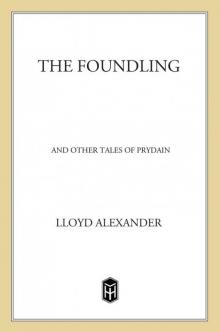 The Foundling and Other Tales of Prydain
The Foundling and Other Tales of Prydain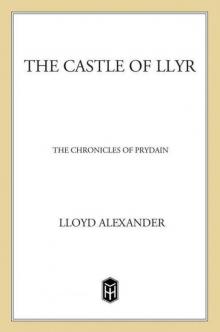 The Castle of Llyr
The Castle of Llyr Taran Wanderer (The Chronicles of Prydain)
Taran Wanderer (The Chronicles of Prydain) Taran Wanderer
Taran Wanderer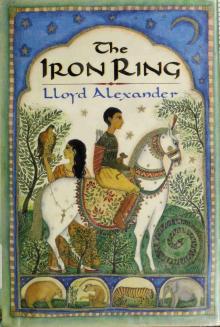 The Iron Ring
The Iron Ring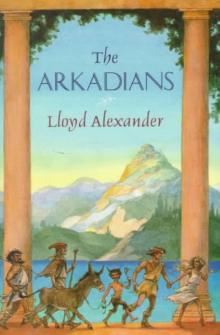 The Arkadians
The Arkadians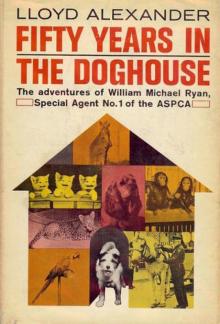 Fifty Years in the Doghouse
Fifty Years in the Doghouse The High King
The High King The Remarkable Journey of Prince Jen
The Remarkable Journey of Prince Jen The Book of Three
The Book of Three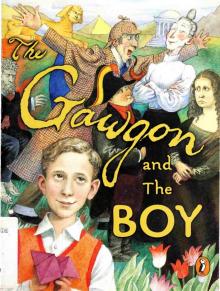 The Gawgon and the Boy
The Gawgon and the Boy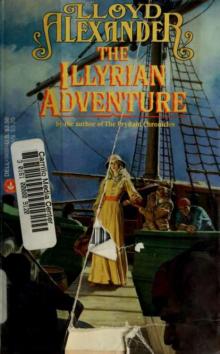 The Illyrian Adventure
The Illyrian Adventure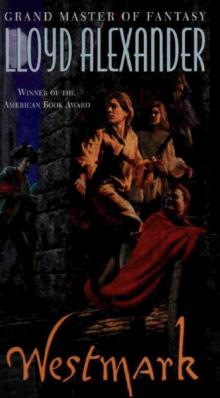 Westmark
Westmark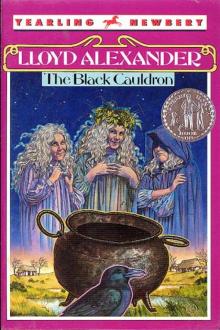 The Black Cauldron
The Black Cauldron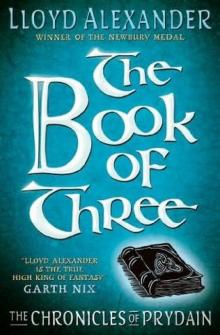 The Book of Three cop-1
The Book of Three cop-1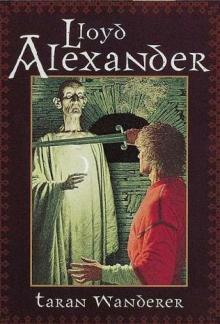 Taran Wanderer cop-4
Taran Wanderer cop-4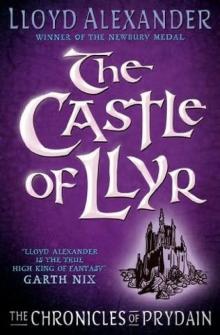 The Castle of Llyr cop-3
The Castle of Llyr cop-3 The High King (Chronicles of Prydain (Henry Holt and Company))
The High King (Chronicles of Prydain (Henry Holt and Company))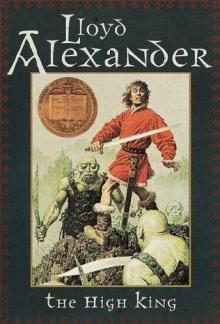 The High King cop-5
The High King cop-5 The Foundling
The Foundling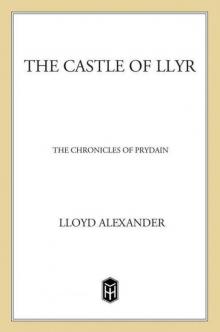 The Castle of Llyr (The Chronicles of Prydain)
The Castle of Llyr (The Chronicles of Prydain)